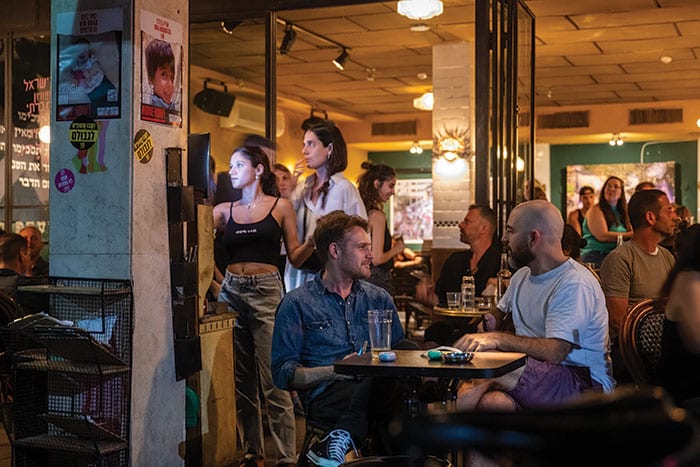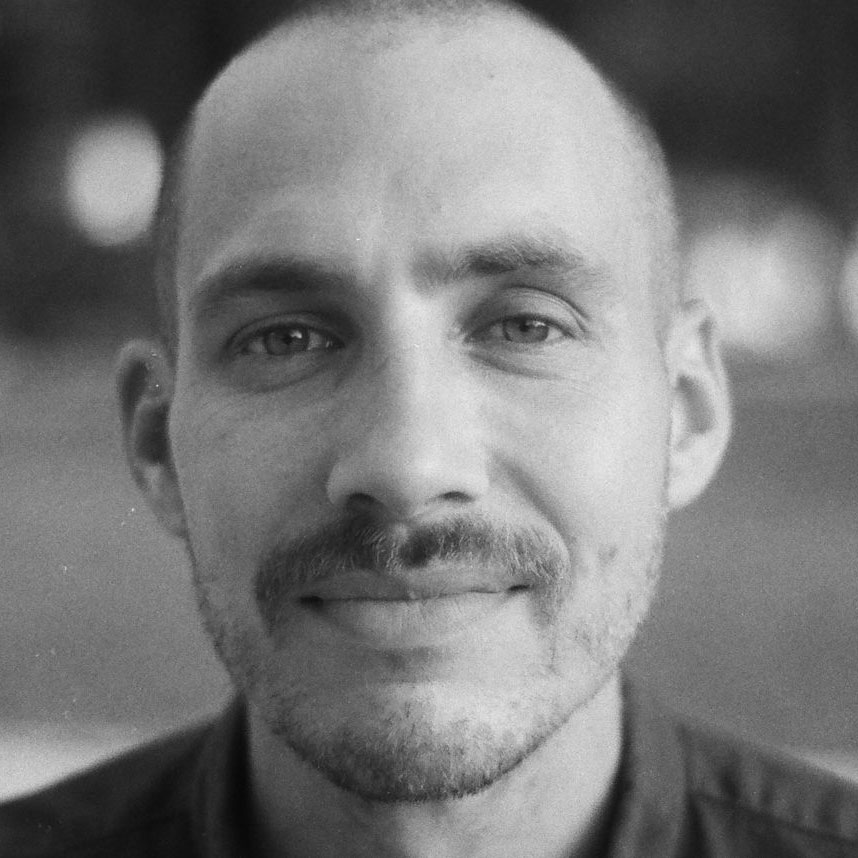 People sit at outdoor bars near posters for the kidnapped civilians during the fourth week of the war, on Nov. 2, 2023 in Tel Aviv, Israel.
Alexi J. Rosenfeld/Getty Images
People sit at outdoor bars near posters for the kidnapped civilians during the fourth week of the war, on Nov. 2, 2023 in Tel Aviv, Israel.
Alexi J. Rosenfeld/Getty Images Israel has long presented itself as the guarantor of Jewish security—but can we really say that this is true in the wake of Oct. 7th?
Moreover, are we even sure that it was true before?
And if it’s not true — what does that say about the success or failure of Zionism? Isn’t Jewish safety the central purpose of Jewish statehood?
In a recent piece in the Forward, Rob Eshman writes: “Despite all evidence to the contrary, Jews in Israel and America continue to see Israel as a safe haven. My question is, why? Since 1948, the greatest number of Jews who’ve been attacked and killed for trying to live as Jews have been Israelis, fighting for, defending or simply trying to live in their state.”
I’ve heard this argument before, sometimes expressed more crudely, as when Seth Rogan pontificated in 2020 that “you don’t keep something you’re trying to preserve all in one place.”
Still, I somehow feel safer in Israel as a Jew than anywhere else. This is the case even after Oct. 7th. Here I know that I won’t be harassed if I walk down the street in a kippah. My synagogue has no armed guards at the door. I know that the posters of the hostages won’t be torn down.
But of course, I can’t really argue with Eshman’s point. He’s right. Israel is, and has long been, the most dangerous place to be a Jew.
His argument, however, focuses narrowly on individual safety and not communal survival. In America, where we think of ourselves largely in individualist and atomized ways, this makes sense, but in Israel, people tend to see themselves as part of a greater collective.
After all, the Holocaust was an attempt to destroy the Jews as a collective. As a result, communal survival is very important to Jews. For many of us, it is more important than individual safety.
In terms of providing the material foundations for communal survival and thriving, Israel is succeeding. The Jewish population in Israel is growing faster than any other Jewish population in the world. According to a 2015 Pew study: “Israel’s Jewish population is expected to grow by about 2.5 million people [by 2050]” while the U.S. Jewish population is expected to decline by about 330,000 during the same period.
When Jews gather together, we become vulnerable to antisemitic violence. This is true at any scale. Being a part of a Jewish community, let alone a state, is to risk one’s safety to a certain degree.
Right now, Jews around the world are confronting this grim truth as they contemplate whether or not it’s safe to walk to services, to attend a Hanukkah event, to drop off their kids at a Jewish school, or to go to a pro-Israel rally.
Despite the fear, we are pushed on by a deep inner conviction that the guarantee of safety, if it means giving up on Jewish community, is not worth it.
Eshman writes he doesn’t see people packing up for Israel as a response to Oct. 7th. He attributes this to the fact that despite surging antisemitism in the U.S., the risk of antisemitic violence in Israel is still higher.
He should look closer. According to the Jerusalem Post: “There has been a striking rise in the number of people exploring the possibility of immigration to Israel” since Oct. 7th.
If these new immigrants aren’t motivated by a desire to be “safe,” what draws them to Israel?
I can only say what draws me to Israel, and why I believe in this place even after Israel failed to protect so many of us on Oct. 7th.
Because of Israel, Hebrew, the ancient language of the Jewish people, has been revived as a spoken tongue. Hebrew culture is no longer a relic passed down from parent to child. It is something that is being generated anew in each generation.
Because of Israel, Jewish religious culture has been able to take on new forms. In the Diaspora, we see a trend of increasing assimilation and polarization between the secular and the religious. In Israel, we see the lines between religious and secular blurring, as people of all backgrounds feel the necessary ownership and the competency to engage the tradition on their own terms.
Because of Israel, the Jewish people has been enriched by the experience of encountering Jews from other parts of the world. The ingathering of Jews that has taken place here has broadened our sense of what it means to be Jewish.
Yes, every time we stand together, there is a target on our back. But we continue to stand together because what we get from one another is worth the risk. In Israel, where millions of Jews are gathered, the risk and the reward are that much greater.
Security, while important, is not the goal of human existence. Our goal is to lead meaningful lives, to form kin and community, and to do good. Security is merely a means to that end.
The purpose of Zionism is not security. The purpose of Zionism is to allow for Jews to lead meaningful and fulfilling Jewish lives and to build enduring Jewish communities and families. Israeli security is a means to this end.
Similarly, the purpose of Zionism is not security. The purpose of Zionism is to allow for Jews to lead meaningful and fulfilling Jewish lives and to build enduring Jewish communities and families. Israeli security is a means to this end.
And so, despite the massive and appalling security failure of Oct. 7th, we need not doubt if Israel is still serving its purpose.
It is.
Matthew Schultz is a Jewish Journal columnist and rabbinical student at Hebrew College. He is the author of the essay collection “What Came Before” (Tupelo, 2020) and lives in Boston and Jerusalem.























 More news and opinions than at a Shabbat dinner, right in your inbox.
More news and opinions than at a Shabbat dinner, right in your inbox.